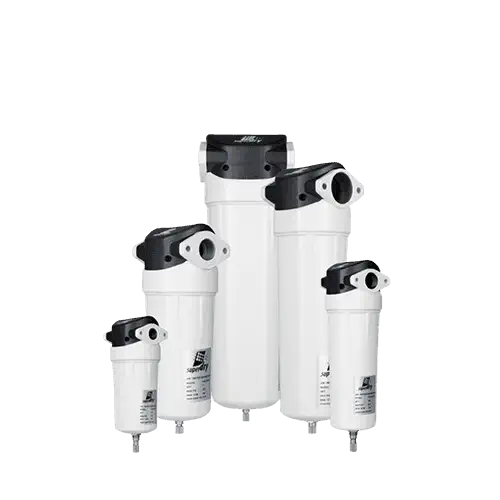In today’s industrial and commercial environments, maintaining efficient operations is not just about maximizing performance—it’s also about controlling costs. One often-overlooked yet highly impactful area is air water separation. This process, which involves removing water from compressed air systems, HVAC units, and other mechanical setups, plays a pivotal role in enhancing operational efficiency and reducing long-term maintenance expenses. High-performance air water separation technology can drastically cut costs, extend equipment lifespan, and prevent costly downtime, making it a vital investment for any organization.
The Hidden Cost of Moisture in Air Systems
Moisture is a silent threat in compressed air and HVAC systems. When water is not properly separated from air, it can lead to a cascade of maintenance problems. Corrosion in pipelines, equipment damage, and system inefficiencies are just a few of the common consequences. Over time, these issues not only impair performance but also result in costly repairs and frequent replacement of components. Additionally, water vapor can affect the quality of products in industries such as pharmaceuticals, electronics, and food processing, where cleanliness and moisture control are essential.
How Air Water Separation Works
Air water separation is a process that involves removing moisture from air before it reaches sensitive machinery or production areas. This is usually accomplished using separators that leverage centrifugal force, filtration, or condensation techniques to extract water from the air stream. In high-performance systems, these separators are designed to remove even microscopic droplets, ensuring that the air delivered is as dry as possible. Effective air water separation ensures optimal air quality, system reliability, and compliance with industry standards.
Advantages of High-Performance Air Water Separation Systems
Investing in a high-performance air water separation system delivers a host of advantages. Firstly, it significantly reduces the risk of corrosion and rust inside pipes and air-driven tools, leading to longer equipment life. Secondly, it enhances the overall efficiency of the system, meaning less energy is wasted on pushing wet or contaminated air. Moreover, high-efficiency separators often come with self-cleaning or low-maintenance features, reducing the need for frequent servicing and labor. These factors contribute to a direct and measurable reduction in operational and maintenance costs over time.
Lower Downtime, Higher Productivity
One of the most critical benefits of advanced air water separation is the reduction in unplanned downtime. Equipment failure due to water ingress is a common issue in systems lacking proper separation technology. When machines break down, not only does it cost money to fix them, but it also halts production, affecting deadlines and revenue. By implementing reliable air water separation, companies can ensure continuous operations and improved productivity. The initial investment in high-performance technology quickly pays off by avoiding these costly interruptions.
Enhanced Energy Efficiency
Moisture in air systems forces compressors and other equipment to work harder, which increases energy consumption. High-performance air water separation prevents this by ensuring that only dry air circulates through the system. As a result, compressors run more efficiently, energy use is optimized, and utility bills are significantly reduced. Over time, the savings on energy alone can justify the cost of installing a quality separation system. Furthermore, more efficient systems are often eligible for energy-saving incentives or rebates, offering an additional financial benefit.
Protecting Sensitive Equipment and Products
In many industries, especially in sectors like electronics manufacturing, pharmaceuticals, and food processing, even a small amount of moisture in the air can damage products or interfere with quality control. High-performance air water separation is essential in these environments. It ensures that production lines maintain strict humidity standards, thereby preventing spoilage, contamination, or failure of sensitive electronic components. In this way, effective air water separation safeguards both the machinery and the final product.
Long-Term Cost Savings
Although installing high-performance air water separation systems might seem like a significant upfront investment, the long-term savings are considerable. By preventing corrosion, reducing energy costs, extending the life of equipment, and minimizing downtime, companies can significantly lower their maintenance budgets. The reduced need for emergency repairs and part replacements leads to a more predictable and manageable maintenance schedule, which in turn contributes to better financial planning and resource allocation.
Improved Compliance with Industry Standards
In many regulated industries, such as pharmaceuticals or food production, strict guidelines govern air quality and moisture levels. High-performance air water separation helps companies stay compliant with these regulations, avoiding fines, legal issues, or reputational damage. Regulatory agencies often inspect systems for their ability to maintain clean and dry air. By investing in advanced separation technology, businesses not only ensure compliance but also demonstrate their commitment to quality and operational excellence.
Sustainability and Environmental Responsibility
High-performance air water separation systems contribute to sustainability by reducing waste and energy consumption. Efficient systems require less frequent replacement of parts and filters, leading to less industrial waste. Moreover, by lowering the energy load on compressors and HVAC systems, these separators contribute to a smaller carbon footprint. Organizations looking to improve their environmental performance or achieve green certifications will find air water separation systems to be a valuable asset in their sustainability strategy.
Conclusion:
In an era where operational efficiency and cost control are paramount, high-performance air water separation offers a smart and sustainable solution. It not only protects valuable equipment and ensures product quality but also delivers substantial savings in maintenance, energy, and downtime. As industries continue to prioritize efficiency and reliability, the adoption of advanced air water separation systems will be crucial in staying competitive. Businesses that invest in this technology today will reap the rewards of reduced costs, improved performance, and long-term resilience in the face of growing operational demands.



